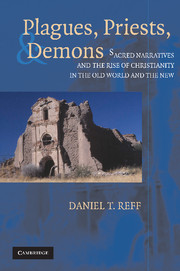 Plagues, Priests, and Demons
Plagues, Priests, and Demons Book contents
- Frontmatter
- Contents
- List of Illustrations
- Acknowledgments
- ONE Introduction
- TWO Disease and the Rise of Christianity in Europe 150–800 c.e.
- THREE Disease and the Rise of Christianity in the New World: The Jesuit Missions of Colonial Mexico
- FOUR The Relevance of Early Christian Literature to Jesuit Missionaries in Colonial Mexico
- Conclusion
- Bibliography
- Index
FOUR - The Relevance of Early Christian Literature to Jesuit Missionaries in Colonial Mexico
Published online by Cambridge University Press: 28 August 2009
- Frontmatter
- Contents
- List of Illustrations
- Acknowledgments
- ONE Introduction
- TWO Disease and the Rise of Christianity in Europe 150–800 c.e.
- THREE Disease and the Rise of Christianity in the New World: The Jesuit Missions of Colonial Mexico
- FOUR The Relevance of Early Christian Literature to Jesuit Missionaries in Colonial Mexico
- Conclusion
- Bibliography
- Index
Summary
To this point I have emphasized the cultural-historical parallels in the rise of Christianity in the late Roman Empire and colonial Mexico. Jesuit authors often were aware of the parallels, explaining in part why they relied on early Christian literature as a source of literary models and rhetoric to represent their New World mission enterprises. In this chapter, I elaborate on the similarities between early Christian and Jesuit literatures. At the same time, I will show how the lives of Jesuit missionaries, including their political/institutional context, resembled the lives of early Christian martyrs and saints. The larger argument advanced is that the “reality” of the mission frontier is, paradoxically, both constituted and reflected in Jesuit missionary texts.
Jesuit “borrowing” ranges from metaphors and epithets – references to the mission frontier as “the Lord's vineyard” or to Satan as a “demonic kinsman” – to long passages that appear to have been suggested by early Christian literature. In a sermon on drinking, which dates to the early sixth century, Bishop Caesarius of Arles complained:
It is said that some of the rustici, when they have either gotten wine or made other drinks for themselves, invited their neighbors and kin for a drinking party as though it were a wedding feast. They keep their guests for four or five days and overwhelm them with excessive drinking.
- Type
- Chapter
- Information
- Plagues, Priests, and DemonsSacred Narratives and the Rise of Christianity in the Old World and the New, pp. 207 - 236Publisher: Cambridge University PressPrint publication year: 2004
